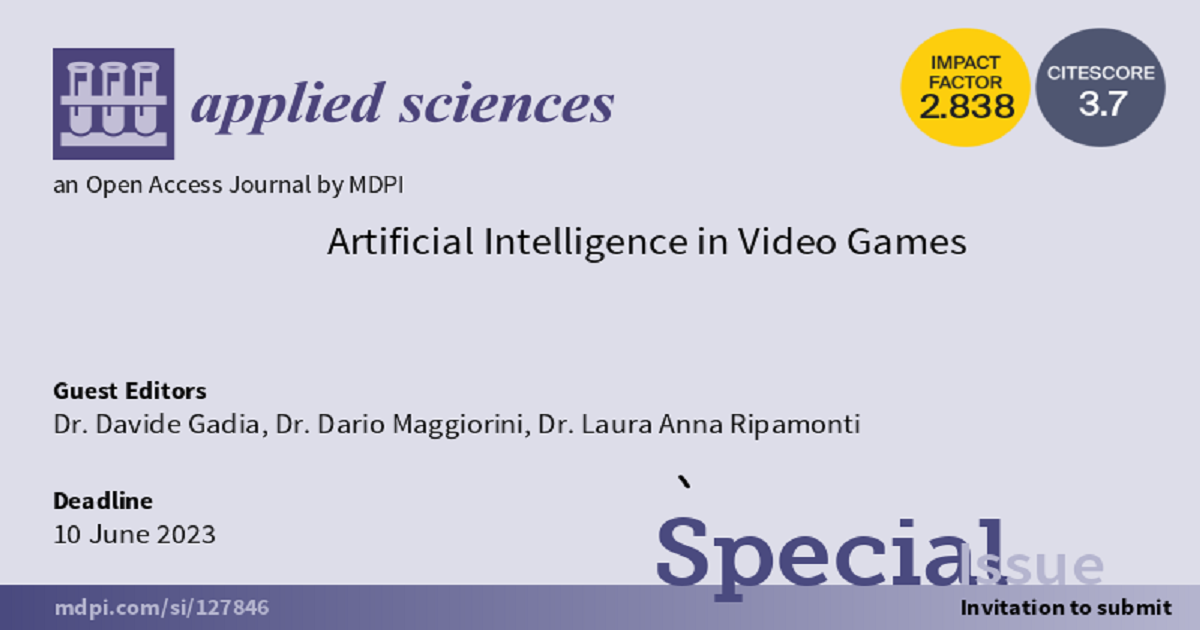Artificial Intelligence in Video Games
A special issue of Applied Sciences (ISSN 2076-3417). This special issue belongs to the section "Computing and Artificial Intelligence".
Deadline for manuscript submissions: closed (10 June 2023) | Viewed by 15216

Special Issue Editors
Interests: computer graphics; video game programming; game engine architectures; procedural content generation; artificial intelligence for video games
Special Issues, Collections and Topics in MDPI journals
Interests: network architectures; distributed systems; multimedia transmission
Special Issues, Collections and Topics in MDPI journals
Interests: technical video game design; AI for video games; HCI; applied games; VR
Special Issues, Collections and Topics in MDPI journals
Special Issue Information
Dear Colleagues,
Today, artificial intelligence (AI) is increasingly implemented in modern video games. AI solutions for video games differ significantly from those typical of classic AI; while the latter aims to emulate a human being and recreate a perfect behaviour to solve a given problem, AI in video games needs to recreate a believable behaviour in a specific context and pose a challenge to the player, while usually running on a CPU and memory budget. Moreover, this challenge must be the result of an imperfect behaviour that allows the player to win through reasonable effort and progress in the game.
AI techniques in video games are used to achieve a wide range of tasks, e.g., pathfinding, decision-making systems for non-playing characters (NPCs), procedural content generation (PCG), interactive storytelling, etc. Moreover, we are witnessing increasing interest in the application of recent and advanced techniques based on machine learning and neural networks.
This Special Issue encourages researchers to present high-quality, original research on artificial intelligent techniques for video games and serious games. Contributions focused on the application of AI to assist gameplay, to enhance the player immersion in the game world, and to support the game and level designers, are particularly welcome. Moreover, papers addressing the use of AI in video games exploiting the hardware capabilities (e.g., constrained computational resources, tracking, sensors) of mobile, virtual reality (VR), and augmented reality (AR) devices, are of special interest for this Special Issue.
Dr. Davide Gadia
Dr. Dario Maggiorini
Dr. Laura Anna Ripamonti
Guest Editors
Manuscript Submission Information
Manuscripts should be submitted online at www.mdpi.com by registering and logging in to this website. Once you are registered, click here to go to the submission form. Manuscripts can be submitted until the deadline. All submissions that pass pre-check are peer-reviewed. Accepted papers will be published continuously in the journal (as soon as accepted) and will be listed together on the special issue website. Research articles, review articles as well as short communications are invited. For planned papers, a title and short abstract (about 250 words) can be sent to the Editorial Office for assessment.
Submitted manuscripts should not have been published previously, nor be under consideration for publication elsewhere (except conference proceedings papers). All manuscripts are thoroughly refereed through a single-blind peer-review process. A guide for authors and other relevant information for submission of manuscripts is available on the Instructions for Authors page. Applied Sciences is an international peer-reviewed open access semimonthly journal published by MDPI.
Please visit the Instructions for Authors page before submitting a manuscript. The Article Processing Charge (APC) for publication in this open access journal is 2400 CHF (Swiss Francs). Submitted papers should be well formatted and use good English. Authors may use MDPI's English editing service prior to publication or during author revisions.
Keywords
- artificial intelligence for video games
- non-playing characters (NPCs)
- artificial agents
- decision making systems
- procedural content generation (PCG)
- evolutionary computation in video games
- machine learning approaches in video games
- artificial intelligence to support game and level design
- artificial intelligence and interactive storytelling
- artificial intelligence techniques for serious games
- artificial intelligence for video games on mobile devices
- artificial intelligence techniques for VR and AR games
Benefits of Publishing in a Special Issue
- Ease of navigation: Grouping papers by topic helps scholars navigate broad scope journals more efficiently.
- Greater discoverability: Special Issues support the reach and impact of scientific research. Articles in Special Issues are more discoverable and cited more frequently.
- Expansion of research network: Special Issues facilitate connections among authors, fostering scientific collaborations.
- External promotion: Articles in Special Issues are often promoted through the journal's social media, increasing their visibility.
- Reprint: MDPI Books provides the opportunity to republish successful Special Issues in book format, both online and in print.
Further information on MDPI's Special Issue policies can be found here.







